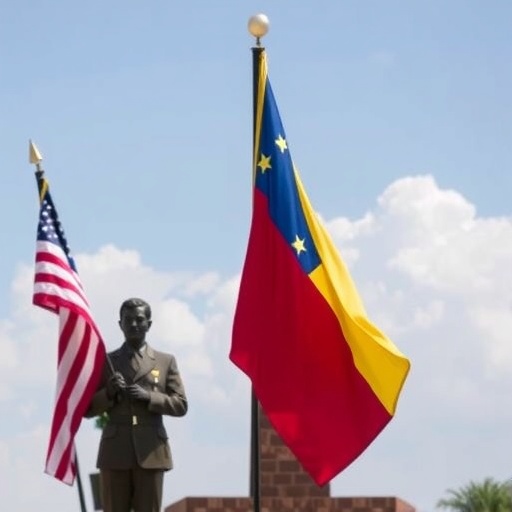Colombia and Mexico Urge U.S. to Halt Military Strikes Near Venezuela Amid Fears of Regional Instability
In a bold diplomatic move that has sent shockwaves through Latin American capitals, leaders from Colombia and Mexico have issued a joint statement demanding the United States immediately cease its military strikes near the Venezuelan border. The warning, delivered during a virtual summit on regional security, highlights growing concerns that U.S. military actions could unravel decades of fragile cooperation in the hemisphere and breach core principles of international law.
- Colombia’s Borderline Alarm: Petro’s Call for De-escalation
- Mexico’s Strategic Intervention: Sheinbaum’s Defense of Multilateralism
- U.S. Military Justifications Clash with Regional Sovereignty Concerns
- Ripples Across Latin America: Trade and Migration on the Brink
- Pathways to Dialogue: Upcoming Talks and Potential Resolutions
The escalation comes amid heightened tensions following a series of U.S. drone operations targeting suspected drug trafficking routes in the Colombia-Venezuela border region. Officials in Bogotá and Mexico City argue that these strikes, while aimed at curbing narcotics flow, risk provoking a broader conflict in an already volatile area plagued by migration crises and economic woes. “We cannot allow unilateral actions to undermine the sovereignty of nations or destabilize our shared neighborhood,” Colombian President Gustavo Petro stated emphatically, echoing sentiments from Mexican President Claudia Sheinbaum.
This intervention marks a rare unified front from two key U.S. allies in the region, underscoring the delicate balance between counter-narcotics efforts and diplomatic relations. As the U.S. military continues to justify its operations under the banner of national security, the international community watches closely, fearing a domino effect on trade, migration, and political stability across South America.
Colombia’s Borderline Alarm: Petro’s Call for De-escalation
Colombia’s position at the forefront of this diplomatic push is no surprise, given its 1,400-mile shared border with Venezuela—a porous frontier that has long been a hotspot for illicit activities. President Petro, who assumed office in 2022 with promises of a more peaceful approach to regional issues, has repeatedly criticized U.S. military interventions as counterproductive. In his address to the summit, Petro detailed how recent U.S. strikes have displaced thousands of indigenous communities along the border, exacerbating the humanitarian crisis.
“The U.S. military presence near Venezuela is not just a threat to our sovereignty; it’s a direct violation of international law that ignores the United Nations Charter,” Petro declared. He referenced Article 2(4) of the UN Charter, which prohibits the use of force against the territorial integrity of any state, arguing that even “precision” strikes encroach on Venezuelan airspace without clear authorization.
Statistics from the Colombian Ministry of Defense paint a grim picture: Over the past year, U.S.-led operations have resulted in at least 15 cross-border incidents, leading to a 20% spike in refugee flows into Colombia. More than 2.5 million Venezuelans already reside in Colombia, straining resources and fueling anti-immigrant sentiments. Petro’s government has proposed alternative strategies, including enhanced bilateral intelligence sharing with Venezuela under the auspices of the Organization of American States (OAS), to address drug trafficking without resorting to military force.
Experts like Dr. Maria Elena Gonzalez, a Latin American security analyst at the University of the Andes, support this view. “Colombia’s economy relies heavily on stable trade with Venezuela—exports worth $500 million annually. Any destabilization could cost us billions and push more migrants northward,” she told reporters. Petro’s administration has also mobilized support from Brazil and Ecuador, forming a nascent coalition to pressure Washington through diplomatic channels.
Mexico’s Strategic Intervention: Sheinbaum’s Defense of Multilateralism
Joining Colombia in this chorus of caution, Mexico’s President Sheinbaum has leveraged her nation’s influential role in hemispheric affairs to amplify the call for restraint. Mexico, which shares no direct border with Venezuela but hosts over 500,000 Venezuelan migrants, views U.S. military actions as a reckless escalation that could spill over into Central America and beyond. Sheinbaum’s statement emphasized the need for dialogue over drones, drawing on Mexico’s historical advocacy for non-interventionism.
“As neighbors to the north, we urge the U.S. to respect international law and engage in multilateral solutions rather than unilateral strikes,” Sheinbaum said in a televised address. She highlighted the potential for these actions to violate the Inter-American Democratic Charter, a key OAS agreement that promotes peaceful resolution of disputes. Mexico’s foreign ministry has already lodged a formal complaint with the UN Security Council, citing precedents from past U.S. interventions in Iraq and Afghanistan as cautionary tales.
The economic stakes for Mexico are substantial. Bilateral trade with the U.S. under the USMCA agreement totals over $800 billion yearly, and any regional instability could disrupt supply chains for oil and agriculture—sectors where Venezuela plays an indirect role through OPEC affiliations. Sheinbaum referenced a recent World Bank report estimating that prolonged tensions could shave 1.5% off Mexico’s GDP growth by increasing energy prices and migration pressures.
In a series of interviews, Mexican diplomats revealed behind-the-scenes efforts to broker talks. “We’ve been in constant communication with the State Department, pushing for a return to the table at the next Summit of the Americas,” said Ambassador Alicia Bárcena, a veteran of international negotiations. Sheinbaum’s approach also includes bolstering Mexico’s own anti-drug initiatives, such as the Mérida Initiative, to demonstrate that cooperation doesn’t require military overreach.
U.S. Military Justifications Clash with Regional Sovereignty Concerns
From the Pentagon’s perspective, the military strikes near Venezuela are a necessary response to surging drug cartels exploiting the border’s chaos. U.S. Southern Command (SOUTHCOM) reports that Venezuelan territory has become a haven for groups like the ELN and dissident FARC factions, facilitating cocaine shipments that flood American streets. In 2023 alone, U.S. Customs and Border Protection seized over 27,000 pounds of cocaine linked to Venezuelan routes, a 15% increase from the previous year.
Defense Secretary Lloyd Austin defended the operations during a congressional hearing, stating, “Our actions are targeted and lawful, aimed at protecting American lives from the fentanyl crisis.” He cited executive authority under the Authorization for Use of Military Force (AUMF) and partnerships with Colombia, which has hosted U.S. troops for joint exercises since the 1990s. However, critics point out that these strikes often occur in disputed airspace, raising questions about compliance with international law.
The legal debate centers on the principle of non-intervention enshrined in the Montevideo Convention of 1933, which Latin American nations hold dear. Legal scholars at the International Court of Justice have noted similarities to the 1986 Nicaragua v. United States case, where the U.S. was ruled against for mining Nicaraguan harbors. “This isn’t just about Venezuela; it’s about the precedent it sets for U.S. military adventurism in the Americas,” argued Professor Carlos Berriz at Georgetown University.
Public opinion in the U.S. is divided. A recent Pew Research poll shows 58% of Americans support military action against drug traffickers, but only 32% favor operations near sovereign borders without allied consent. Meanwhile, protests in cities like Miami and Los Angeles have drawn Venezuelan exiles decrying the strikes as prolonging the Maduro regime’s grip on power.
Ripples Across Latin America: Trade and Migration on the Brink
The warnings from Colombia and Mexico extend far beyond rhetoric, threatening to reshape Latin American geopolitics. Venezuela’s ongoing political crisis under President Nicolás Maduro has already displaced 7.7 million people since 2014, according to the UN Refugee Agency (UNHCR). U.S. military actions could accelerate this exodus, overwhelming borders from Colombia to Mexico and straining U.S. resources at the southern frontier.
Economic interdependence amplifies the risks. The U.S. imports $10 billion in Venezuelan oil annually, despite sanctions, through secondary markets. Disruptions could spike global energy prices, hitting inflation-weary economies in Colombia (where oil accounts for 50% of exports) and Mexico (a major OPEC+ player). A joint report by the Inter-American Development Bank warns of a potential 2-3% contraction in regional GDP if tensions escalate into open conflict.
On the migration front, Colombia’s Operation Hope has integrated Venezuelan refugees into its workforce, but experts fear strikes could undo progress. “We’ve seen a 25% rise in asylum claims in the last quarter,” noted UNHCR spokesperson William Spindler. Mexico, meanwhile, has ramped up border patrols, but Sheinbaum’s administration prioritizes humanitarian visas over walls.
Environmental concerns also loom large. The Orinoco River basin, shared by Colombia and Venezuela, faces contamination from unchecked mining fueled by cartel activities. U.S. strikes, while targeting labs, have inadvertently damaged ecosystems, prompting outcry from indigenous groups represented in the summit’s indigenous caucus.
Pathways to Dialogue: Upcoming Talks and Potential Resolutions
Looking ahead, the international spotlight turns to upcoming forums where these tensions could be addressed. The UN General Assembly in September offers a platform for Colombia and Mexico to rally support, potentially leading to a resolution condemning unilateral U.S. military actions. Diplomats from both nations are pushing for a special OAS session focused on Venezuela, inviting U.S. participation to hash out a code of conduct for border operations.
Analysts predict that backchannel negotiations, possibly involving Brazil’s President Lula da Silva as a mediator, could yield a temporary halt to strikes in exchange for Venezuelan commitments to curb cartel safe havens. The Biden administration has signaled openness to dialogue, with Secretary of State Antony Blinken scheduled to meet counterparts in Bogotá next month.
Yet challenges persist. Venezuela’s Maduro has seized on the controversy to bolster his anti-imperialist narrative, vowing retaliation through alliances with Russia and China—nations that have increased military aid to Caracas. If unresolved, this rift could fracture the Lima Group, a coalition formed in 2017 to pressure Maduro, and embolden authoritarian regimes elsewhere in the region.
For the U.S., recalibrating its approach might involve shifting resources to non-military aid, such as the $1.2 billion allocated for anti-drug tech in Latin America under the 2024 budget. As regional leaders like Petro and Sheinbaum emphasize, true stability demands partnership, not provocation. The coming weeks will test whether Washington heeds the call, or if the drums of discord beat louder across the Americas.








